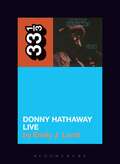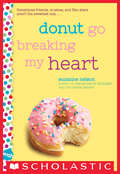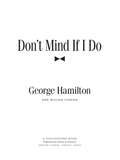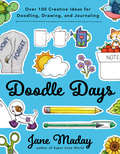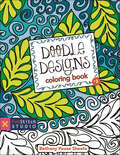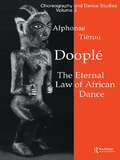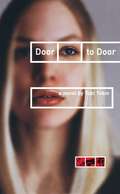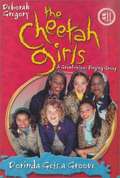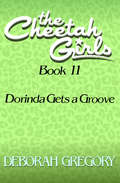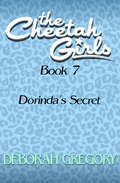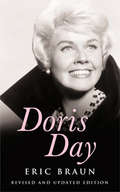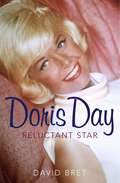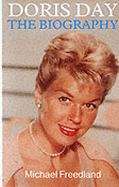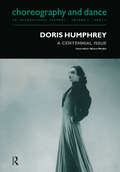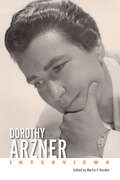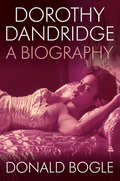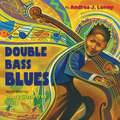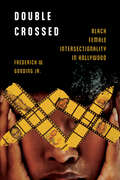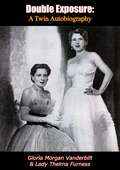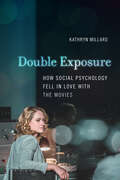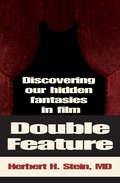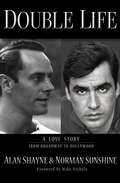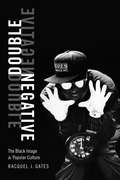- Table View
- List View
Donald Shebib's 'Goin' Down the Road'
by Geoff PevereSince its release in July 1970, Donald Shebib's low-budget road movie about displaced Maritimers in Toronto has become one of the most celebrated Canadian movies ever made. In this study of Goin' Down the Road, renowned film critic Geoff Pevere provides an engaging account of how a film produced under largely improvised circumstances became the most influential Canadian movie of its day as well as an enduring cultural touchstone.Featuring extensive interviews with the film's key participants, Pevere provides behind-the-scenes history and explores how the movie's meaning and interpretation have changed over time. He gives special attention to the question of why the film's creative mix of documentary techniques, road movie tropes, and social commentary have proven so popular and influential in Canadian filmmaking for decades.
Donny Hathaway Live (33 1/3 Ser. #117)
by Emily J. LordiIn January of 1979, the great soul artist Donny Hathaway fell fifteen stories from a window of Manhattan’s Essex House hotel in an alleged suicide. He was 33 years old and everyone he worked with called him a genius. Best known for “A Song for You,” “This Christmas,” and classic duets with Roberta Flack, Hathaway was a composer, pianist, and singer committed to exploring “music in its totality.” His velvet melisma and vibrant sincerity set him apart from other soul men of his era while influencing generations of singers and fans whose love affair with him continues to this day.
Donut Go Breaking My Heart: A Wish Novel (Wish Ser.)
by Suzanne NelsonAnother “foodie” novel filled with boys, friends, film sets . . . and donuts—from the author of Cake Pop Crush and You’re Bacon Me Crazy.Sheyda is a behind-the-scenes girl. She loves helping out in the kitchen of Doughlicious, the donut shop run by her best friend’s family. And Sheyda loves designing stage sets while others perform in the spotlight. Then lights, camera . . . surprise! Tween heartthrob Cabe Sadler is filming his next movie in Doughlicious! Sheyda’s outgoing BFF, Kiri, is sure this will lead to stardom, and perhaps a date with Cabe. But somehow it’s Sheyda who gets picked for a small role in the film.To make matters worse, Cabe seems spoiled and rude. Too bad he’s so cute. Can Sheyda overcome her stage fright, get to know the real Cabe, and find her own kind of stardom?
Don’t Mind If I Do
by George HamiltonSpend a few hours with George Hamilton? Don't Mind If I Do Don't let that tanned, handsome, charming surface fool you. Beneath the bronzed façade is a mischievous mind with a wicked wit. George Hamilton doesn't miss a thing. With a front row seat for classic Hollywood's biggest secrets and scandals, George has the intelligence, heart, and unflappable spirit to tell his story, and the story of Tinseltown's heyday, with great good humor and delicious candor -- as only he can. From Where the Boys Are to Dancing with the Stars; from Mary Pickford to Elizabeth Taylor; from smalltown Arkansas to the capitals of Europe -- it's all here, and George has lived to tell and to laugh about it. As the child of a Dartmouth-educated bandleader father and a glamorous Southern debutante mother whose marriage crumbled early on, George had a childhood filled with misadventures and challenges that his mother always seemed able to turn from tragedy to comedy. Her idea of changing the family's fortunes involved a trip cross-country with three sons and a poodle in a Lincoln Continental, making stops along the way to search for husband/father number three. And she was quick to recognize that George's potential success lay in Hollywood. George starved nobly for his art in the late 1950s, but was soon starring in major motion pictures directed by the likes of Vincente Minnelli and Louis Malle. He has forgotten more about Hollywood than most movie experts will ever know and shares intimate and hugely entertaining stories of his friendships with Cary Grant; Brigitte Bardot; Robert Mitchum; Merle Oberon; Mae West; Sammy Davis, Jr.; and Judy Garland -- not to mention Lyndon B. Johnson and Elvis's Colonel Tom Parker as well as the King himself -- among others. The world is Hamilton's oyster, and this ultimate insider is ready to share it with us. So fasten your seat belt. We'll tell you when it's safe to move about the cabin again.
Doodle Days: Over 100 Creative Ideas for Doodling, Drawing, and Journaling
by Jane MadaySimple and fun doodle ideas and inspiration for anyone who loves to draw, sketch, or journalWhether you're into journaling, drawing, or both, this delightful guide will provide creative ideas and simple instruction for doodling to your heart's content. Artist and author Jane Maday presents basic techniques, step-by-step instructions, and a world of ideas for drawing animals, flora and fauna, seashells, shapes, and more. The perfect way to add whimsy and fun to any sketchbook, journal, or bujo page, these doodles will make you smile and help you express your creativity, one adorable little doodle at a time.
Doodle Designs Coloring
by Bethany Pease SheetsColoring has never been this creative. Get inspired with 18 different designs you can color or draw or paint all day. Add your own flair with pens, pencils, crayons, markers or paint. Learn how colors go together and try out a new color theory today. • Keep yourself busy in the car, while waiting for friends - anywhere you go • Decorate your room, your binder, or your locker with finished pages, or give them to friends • Collect the whole series! Each book features designs by different quilt artists Doodle Designs has 18 magnificent freeform designs to color, plus fun facts about quilting designs. *Free table-top display available with purchase of 12 coloring books! (Wholesale minimum: 3 units.)
Doople: The Eternal Law of African Dance (Choreography and Dance Studies Series)
by Alphonse TierouThe African dancer requires complete technical mastery and must respect the precise rules handed down by the society of the Masques de Sagesse. Alphonse Tirou is from the Ouenon people of the Ivory Coast. His major study is the first written record of this oral tradition and it explains the movements, codes and meanings of the traditional African dance. It is extremely valuable reading for all those studying or interested in Africa, as dance is such an essential part of this continent's cultural heritage.A former student of the National Institute of Arts at Abidjan, Alphonse Tirou has been a senior dignitary in the Kman of the Masques de Sagesse for over twenty years. He is currently teaching at the Bloa Nam (Movements) dance school in Nmes, which he founded in 1979 and which is still the only school worldwide to research African dance.
Door to Door
by Tobi TobinIn this edgy, frenetic fictionalized memoir, a small-town girl turned linchpin of the Los Angeles club scene draws on her intoxicating but conflicted years working the door of Hollywood's hottest clubs to pen a striking story of ambition, loss, and love. After growing up in idyllic Bloomfield Hills, Michigan, seventeen-year-old Tobi leaves behind a childhood that was anything but idyllic and chases her dreams of modeling to New York. When the Big Apple turns out to be a bust, Tobi finds her way to L.A. and to the fringes of the film world elite. Hungry for an "in" she gets busy barhopping, party-going, and producer-hunting, eventually falling into a beautiful but complicated relationship with a famous actor. Though her own acting career never takes off, a chance encounter lands her a job working the door of an old friend's club. A whole new world opens up. Raw and revealing, Door to Door is both an unprecedented glimpse into the L.A. club scene and the riveting story of a girl who puts it all on the line for her chance to become somebody.
Dorinda Gets a Groove (Cheetah Girls #11)
by Deborah GregoryDorinda thinks that she and her sister, Tiffany, are totally different, but they actually have something in common - a love for music! Dorinda can dance and sing, and Tiffany can jam on the keyboard.
Dorinda Gets a Groove: Dorinda Gets A Groove (The Cheetah Girls #11)
by Deborah GregoryAfter living most of her life in foster care, Dorinda knows she should be happy when her sister Tiffany is adopted by a rich family. But no matter how hard she tries, she can&’t help but feel jealous of Tiff&’s new clothes, new apartment, and fancy new keyboard. But when they start playing music together, they find they have the kind of musical connection Dorinda never thought possible.Their chemistry is so natural that Tiffany doesn&’t think twice before asking to join up with Dorinda&’s superfabulous girl group, the Cheetah Girls. But will adding a new member upset the balance of the band? Dorinda must choose between her fellow Cheetahs and the sister she thought she had lost forever.
Dorinda's Secret: Dorinda's Secret (The Cheetah Girls #7)
by Deborah GregoryIn this latest book of a contemporary series for black teens, featuring a five-member singing group, Dorinda tries to hide the fact that her sister is white, which presents a problem when her sister decides to show up at the Cheetah Girls&’ concert.
Doris Day
by Eric BraunAn in-depth and fascinating study of one of Hollywood's most popular icons - fully updated and including previously unreleased pictures.Doris Day is almost always portrayed as the sunny, squeaky-clean girl next door. This wholesome image kept her at the top for twenty-four years and thirty-nine films.But behind the effervescent, ever-cheerful image that Doris Day portrayed through dozens of classic Hollywood movies was an extraordinary story of private pain. Her dazzling smile hid a tormented personal life that included four marriages, and a terrifying accident that nearly ended her life. And yet for generations of movie-goers Doris Day remained the embodiment of innocent beauty and apple-pie homeliness, and even today she exerts a powerful fascination for millions of fans around the world.
Doris Day
by Eric BraunAn in-depth and fascinating study of one of Hollywood's most popular icons - fully updated and including previously unreleased pictures.Doris Day is almost always portrayed as the sunny, squeaky-clean girl next door. This wholesome image kept her at the top for twenty-four years and thirty-nine films.But behind the effervescent, ever-cheerful image that Doris Day portrayed through dozens of classic Hollywood movies was an extraordinary story of private pain. Her dazzling smile hid a tormented personal life that included four marriages, and a terrifying accident that nearly ended her life. And yet for generations of movie-goers Doris Day remained the embodiment of innocent beauty and apple-pie homeliness, and even today she exerts a powerful fascination for millions of fans around the world.
Doris Day: Reluctant Star
by David BretWith her bobbed, blonde hair and flashing smile, Doris Day was portrayed as the girl next door – a virginal girl that you could take home to your parents. In real life, she was not quite the happy-go-lucky blonde with the bubbly personality promoted by Warner Brothers who simply wanted to market her as a commodity. Married young, to a violent bully, and with a child, Day had to work hard, touring with bands, to get her start in showbusiness. A reluctant star, all Doris Day wanted to do was settle down to a happy, simple life but somehow managed to always attract the wrong kind of men – thugs and crooks who took their anger out on her. And yet this didn&’t stop her from enjoying sexual exploits with a number of leading men. She worked hard – not to become a success but for a job – and yet her manager managed to defraud her of millions. How could this happen to such a smart lady – perhaps she was too trusting? In this revealing biography, David Bret takes a fascinating look at the trials and tribulations behind what seemed to her adoring fans to be the perfect woman. From her German Jewish parents to her donation to an airlift of cats and dogs in Louisiana, as well as full discography and film lists, this is a captivating look at a resilient American icon.
Doris Humphrey: A Centennial Issue (Choreography and Dance Studies Series)
by Naomi MindlinIn honour of Doris Humphrey's centennial, which was celebrated worldwide in 1995, this issue explores her legacy to the world of dance and her place in history. The varied aspects of her work are covered including choreography, teaching approach, Labanotation scores, reconstruction/recreations, and composition.In order to convey a sense of movement into the next century, the articles are presented in "chronological" order, beginning with that of Ernestine Stodelle, who worked with Humphrey during the 1920's and ending with an examination of Mindlin's 1995 experience learning Humphrey's work from Stodelle.
Dorothy Arzner: Interviews (Conversations with Filmmakers Series)
by Martin F. NordenThrough dozens of interviews, a detailed chronology and filmography, and a selection of Dorothy Arzner’s own writings—including her unfinished autobiography—Dorothy Arzner: Interviews offers major insights into and an in-depth examination of the life and career of one of the few women to direct films during Hollywood’s Golden Age. A key figure in Hollywood for decades, she directed more studio films than any other woman in history. Her movies often focused on courageous women who must make difficult decisions to remain true to themselves—women not unlike Arzner herself, who once said that “all we can ever do in our work is write our own biography.”Dorothy Arzner (1897–1979) began her film career in 1919 as a script typist for the Famous Players-Lasky company, which later became Paramount Pictures. She quickly rose through the ranks to become a script supervisor, screenwriter, and editor before directing her first film, Fashions for Women, in 1927. After the release of her final Hollywood film, First Comes Courage, in 1943, Arzner changed directions in her professional life. She made several training films for the Women’s Army Auxiliary Corps during World War II and directed many television commercials for Pepsi-Cola in the 1950s. She concluded her career by serving as a filmmaking instructor at the Pasadena Playhouse College of Theatre Arts and UCLA, where she helped launch the first wave of college-trained moviemakers.
Dorothy Dandridge: A Biography
by Donald BogleAvailable once again, the definitive biography of the pioneering Black performer—the first nominated for a Best Actress Academy Award—who broke new ground in Hollywood and helped transform American society in the years before Civil Rights movement—a remarkable woman of her time who also transcended it. “An ambitious, rigorously researched account of the long-ignored film star and chanteuse. . . . Bogle has fashioned a resonant history of a bygone era in Hollywood and passionately documented the contribution of one of its most dazzling and complex performers."—New York Times Book ReviewIn the segregated world of 1950s America, few celebrities were as talented, beautiful, glamorous, and ultimately influential as Dorothy Dandridge. Universally admired, she was Hollywood's first full-fledged Black movie star. Film historian Donald Bogle offers a panoramic portrait of Dorothy Dandridge’s extraordinary and ultimately tragic life and career, from her early years as a child performer in Cleveland, to her rise as a nightclub headliner and movie star, to her heartbreaking death at 42. Bogle reveals how this exceptionally talented and intensely ambitious entertainer broke down racial barriers by integrating some of America's hottest nightclubs and broke through Tinseltown’s glass ceiling. Along with her smash appearances at venues such as Harlem’s famed Cotton Club, Dorothy starred in numerous films, making history with her role in Otto Preminger’s Carmen Jones, playing opposite Harry Belafonte. Her performance earned her an Academy Award nomination for Best Actress—the first Oscar nod for a woman of color.But Dorothy’s wealth, fame, and success masked a reality fraught with contradiction and illusion. Struggling to find good roles professionally, uncomfortable with her image as a sex goddess, coping with the aftermath of two unhappy marriages and a string of unfulfilling affairs, and overwhelmed with guilt for her disabled daughter, Dorothy found herself emotionally and financially bankrupt—despair that ended in her untimely death.Woven from extensive research and unique interviews, as magnetic as the woman at its heart, Dorothy Dandridge captures this dazzling entertainer in all her complexity: her strength and vulnerability, her joy and her pain, her trials and her triumphs.
Double Bass Blues
by Andrea J. LoneyA Caldecott Honor Book! A joyous celebration of family, community, and the unifying power of music, perfect for fans of Last Stop on Market Street.Nic is an aspiring musician whose life spans two different worlds--his suburban school where he wows his friends in orchestra, and the busy city streets of his home where he's jostled by the crowd. Nic makes his way home from a busy day at school with a double bass on his back, the symphony of his surroundings in his heart, and a sweet surprise for the reader at the end of his journey. This is a sweet, melodious picture book about how dedication, music, and family can overcome any obstacle.
Double Crossed: Black Female Intersectionality in Hollywood (Race, Rhetoric, and Media Series)
by Frederick W. Gooding Jr.Despite Hollywood’s recent efforts to appeal to more racially diverse audiences, mainstream movies routinely present a limited view of non-Whites generally, and Black women specifically, in stark contrast to the broadly developed spectrum of White characters. Black women characters are frequently rendered invisible, and even in films featuring their image, Black women characters too often fall prey to historically stereotypical patterns. These consistently marginalized Black female images serve to reflect and reinforce messages of racial imbalance distributed worldwide. In Double Crossed: Black Female Intersectionality in Hollywood, author Frederick W. Gooding Jr. chronicles the Black female experience through the lens of Hollywood. Gooding begins by contextualizing the origins of early Black female imagery on screen, largely restricted to the domestic mammy figure, then traces how these images have shifted over time. Through close readings of such films as Gone with the Wind, Bringing Down the House, The Princess and the Frog, and The Help, as well as case studies looking at Oprah Winfrey and Shonda Rhimes, Gooding considers not only the image the Black woman creates, but also the shadow she casts. This volume demonstrates the historical, economic, and social consequences of Hollywood’s distorted representation of Black women on screen and in real life.
Double Exposure: A Twin Autobiography
by Gloria Morgan Vanderbilt Lady Thelma FurnessIn 1921 there burst upon the New York social scene the famous Morgan twins, Thelma and Gloria, whose names in the decade that followed came to spell glamour and excitement in that magic world of the “international set.” Two continents thrilled to Thelma Furness’s romances with Richard Bennett, Lord Furness, the Prince of Wales, Aly Khan, and Edmund Lowe. The whole world followed with bated breath the searing custody trial over young Gloria that pitted mother against daughter and shook the Vanderbilts and society. While much has been written from the outside about all of this, the two principals have never before disclosed the real truth behind the rumors and the headlines. And exciting as are their personal adventures and escapades, their story is also a portrait of an era.In every age there have been certain women who through a combination of beauty and personality have attracted the love and admiration of rich or famous men, and who seem to be the embodiments of the feminine charm of the period. The Edwardian era had its Lily Langtry, the Napoleonic its Josephine, the eighteenth century its Du Barry and its Lady Hamilton—and so on back to antiquity. In our time, among those women who have come close to fitting this role are Lady Furness and Gloria Vanderbilt.From childhood each had the elusive qualities that characterize the femme fatale. Both knew the love of many men, both suffered deeply, and now both have happily risen above the vicissitudes of their checkered careers and face the future with gallantry, humor, and without rancor or bitterness over the past. In this spirit, and with all sincerity, they have set down the story of their lives.In Double Exposure, we are given a matchless picture of life among the great—and the near-great—in the now-vanished world between the two wars. Above all, we come to know the minds and hearts and philosophy of life and love of two fascinating women, and something of the nature of fascination itself.
Double Exposure: How Social Psychology Fell in Love with the Movies
by Kathryn MillardDouble Exposure examines the role of film in shaping social psychology’s landmark postwar experiments. We are told that most of us will inflict electric shocks on a fellow citizen when ordered to do so. Act as a brutal prison guard when we put on a uniform. Walk on by when we see a stranger in need. But there is more to the story. Documentaries that investigators claimed as evidence were central to capturing the public imagination. Did they provide an alibi for twentieth century humanity? Examining the dramaturgy, staging and filming of these experiments, including Milgram's Obedience Experiments, the Stanford Prison Experiment and many more, Double Exposure recovers a new set of narratives.
Double Feature: Discovering Our Hidden Fantasies in Film
by Herbert H. Steina) What recent smash hit movie secretly depicted fear of the female breast? b) Name some recent films that were preoccupied with castration anxiety? c) Would you be surprised to know that reliving our childhood Oedipal fixations helps us to better understand adult-themed films? You'll find the answers to these and many similarly intriguing questions in DOUBLE FEATURE: DISCOVERING OUR HIDDEN FANTASIES IN FILM by Herbert Stein, M.D. Dr. Stein, a highly-respected Freudian psychiatrist and passionate moviegoer, literally puts our favorite films on the couch and shares his confidential findings with us. In a book that could become a cult classic, he lays bare the truth about unconscious and subconscious themes running through popular culture with fresh, jolting, and often moving insights into some of the most popular films ever made, including JURASSIC PARK, FIELD OF DREAMS, FORRST GUMP, THE SIXTH SENSE, and THE USUAL SUSPECTS. However perceptive we may think ourselves, this book reveals how we unconsciously respond to deeply-embedded archetypal themes in movies and enables us to re-experience films we love in a completely fresh way. Indeed, DOUBLE FEATURE makes our favorite films even more resonant and enables us to articulate even more deeply what it is we love about them.
Double Life: Portrait of a Gay Marriage From Broadway to Hollywood
by Alan Shayne Norman Sunshine&“A fascinating, frank and page-turning memoir about the lifelong love affair of two extraordinary men&” (Candace Bushnell, author of Sex and the City). The human story at the center of this debate is told in Double Life, a dual memoir by a gay male couple in a fifty-plus year relationship. With high profiles in the entertainment, advertising, and art communities, the authors offer a virtual timeline of how gay relationships have gained acceptance in the last half-century. At the same time, they share inside stories from film, television, and media featuring the likes of Marlon Brando, Katharine Hepburn, Rock Hudson, Barbra Streisand, Laurence Olivier, Truman Capote, Bette Davis, Robert Redford, Lee Radziwill, and Frances Lear.Double Life is a trip through the entertainment world and a gay partnership in the latter half of the twentieth century. As more and more same sex couples find it possible to say &“I do,&” the book serves as an important document of how far we&’ve come.
Double Negative: The Black Image and Popular Culture
by Racquel J. GatesFrom the antics of Flavor Flav on Flavor of Love to the brazen behavior of the women on Love & Hip Hop, so-called negative images of African Americans are a recurrent mainstay of contemporary American media representations. <P><P>In Double Negative Racquel J. Gates examines the generative potential of such images, showing how some of the most disreputable representations of black people in popular media can strategically pose questions about blackness, black culture, and American society in ways that more respectable ones cannot. <P><P>Rather than falling back on claims that negative portrayals hinder black progress, Gates demonstrates how reality shows such as Basketball Wives, comedians like Katt Williams, and movies like Coming to America play on "negative" images to take up questions of assimilation and upward mobility, provide a respite from the demands of respectability, and explore subversive ideas. By using negativity as a framework to illustrate these texts' social and political work as they reverberate across black culture, Gates opens up new lines of inquiry for black cultural studies.

